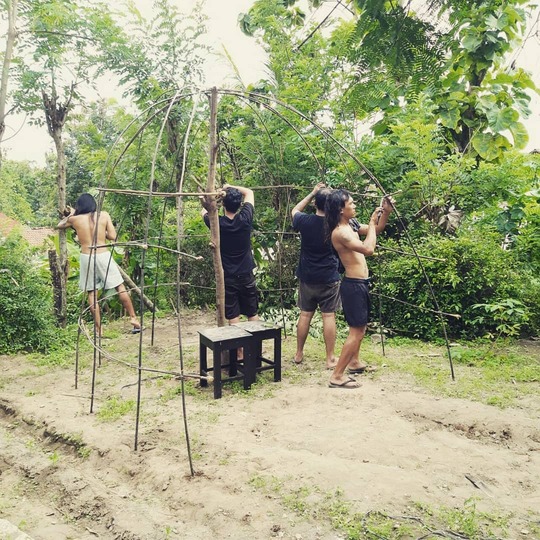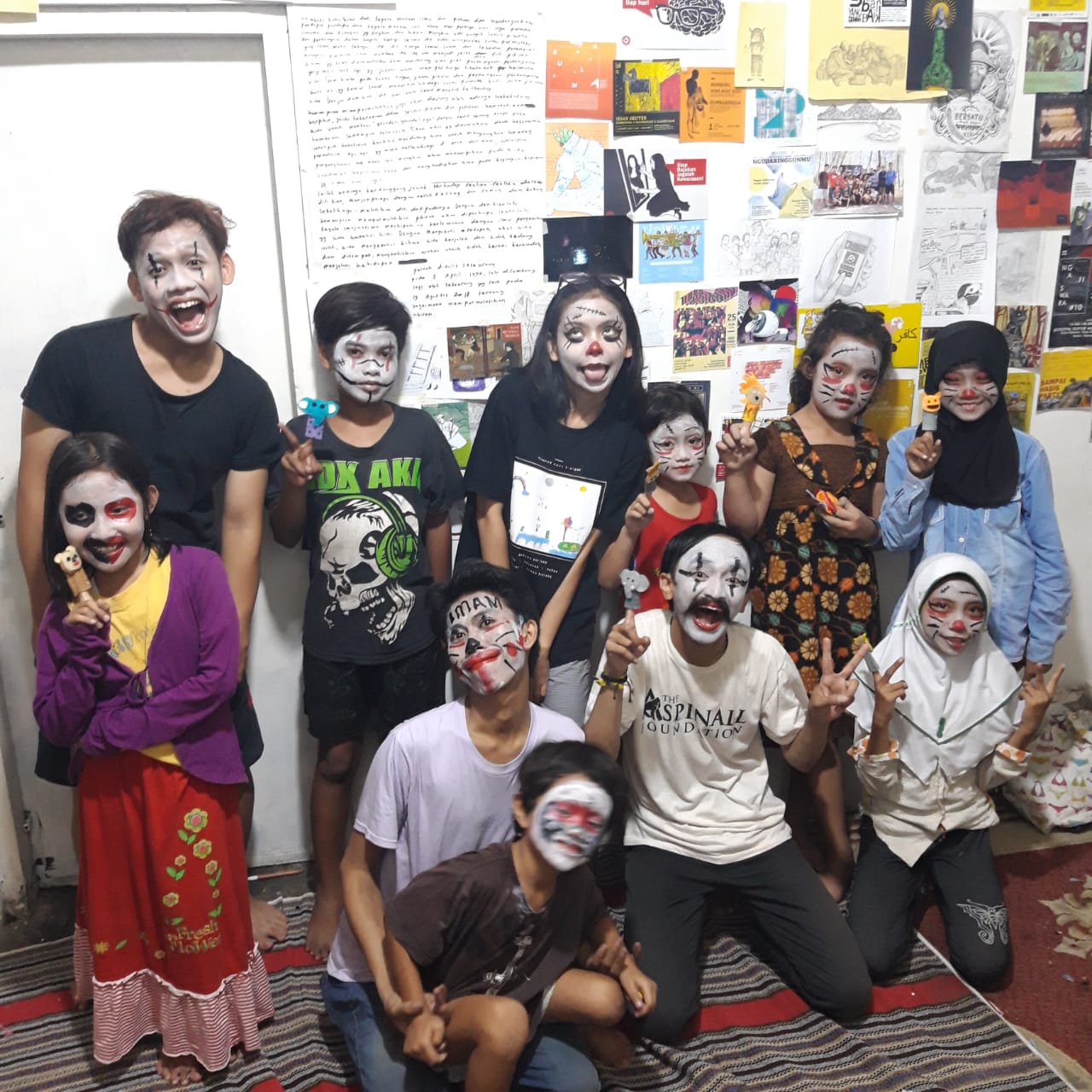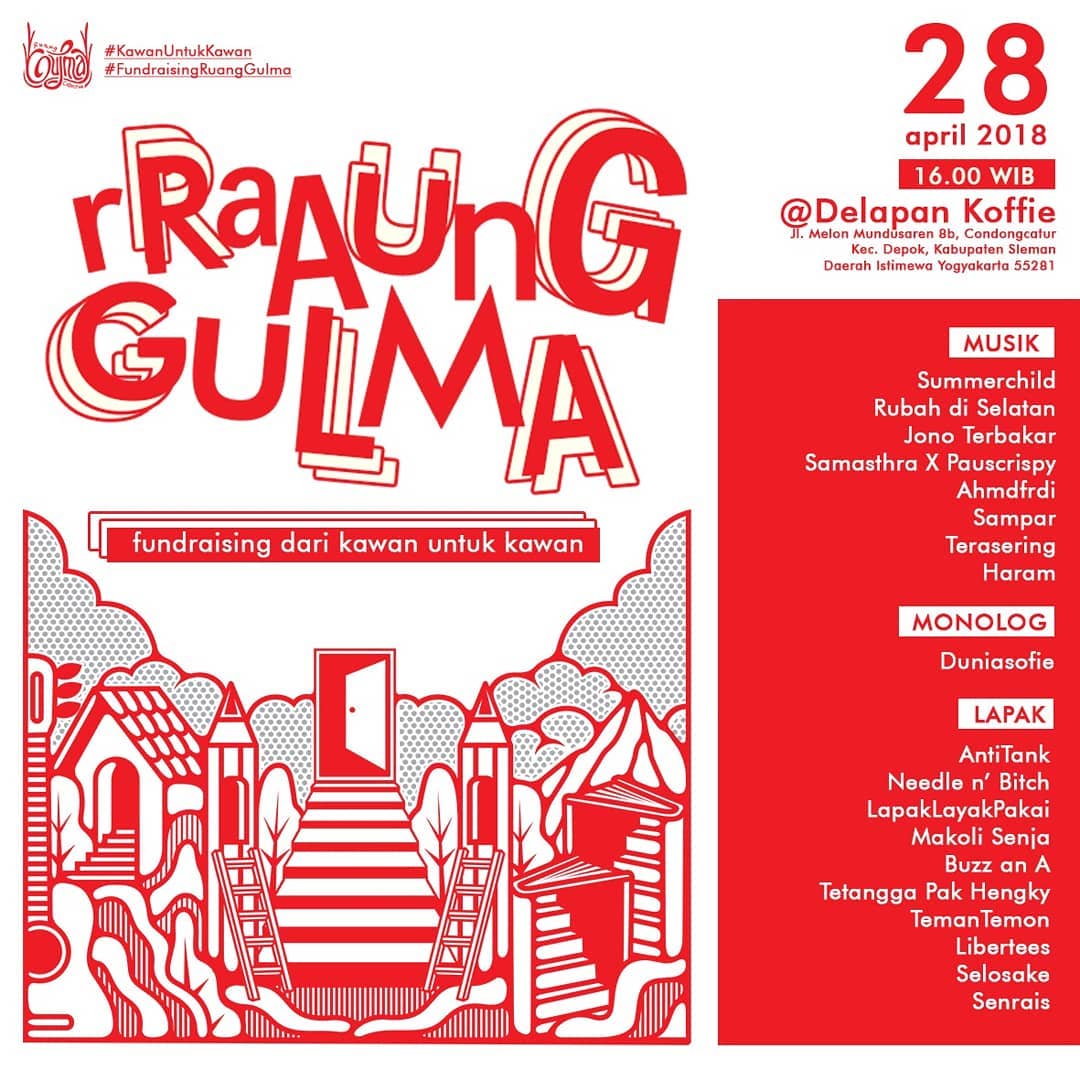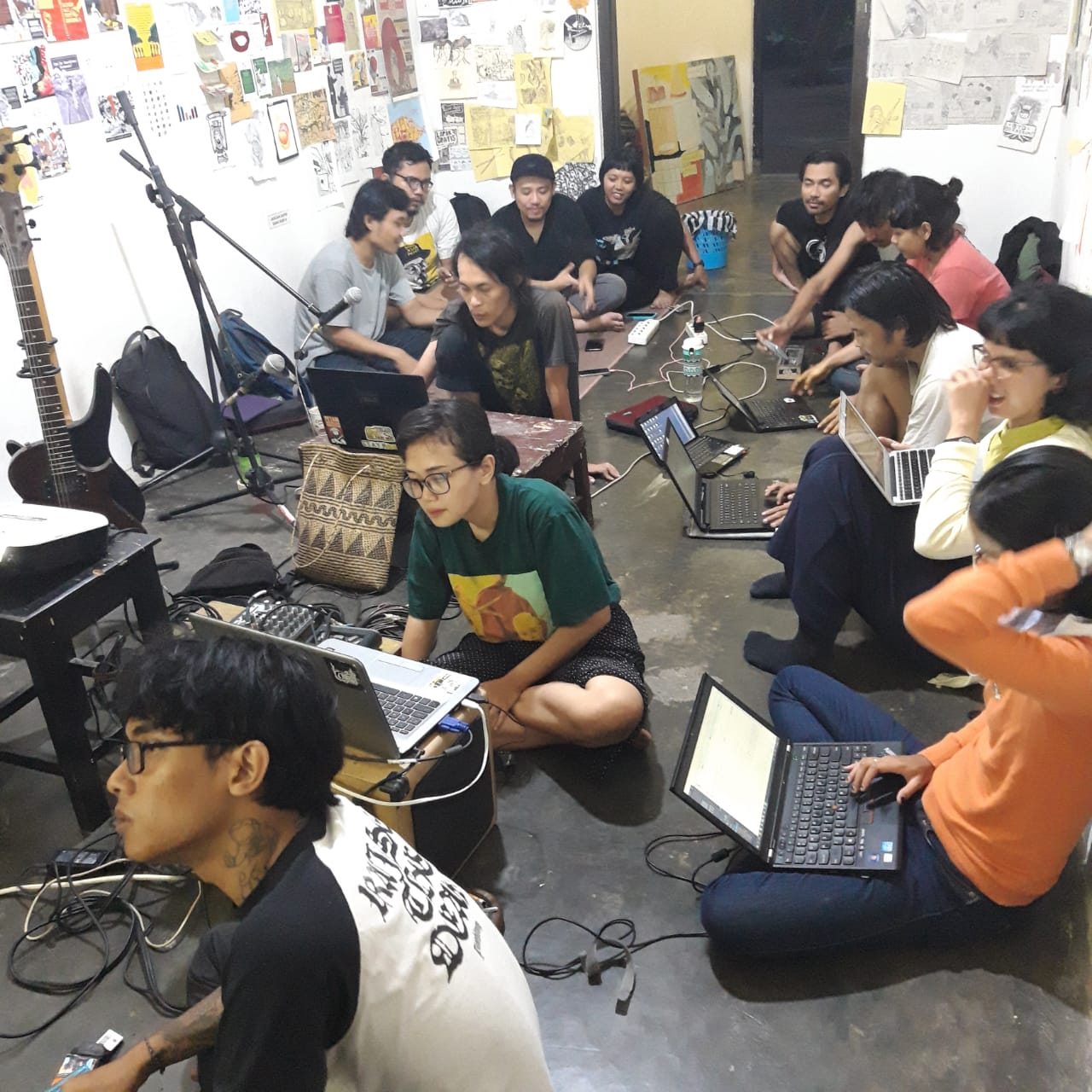
How To Balance The Art Ecosystem and Rural Life In The Ruang Gulma Collective
Indonesian version below
If you start speaking to people about autonomously run creative spaces in Yogyakarta, the name Ruan Gulma comes up constantly. Located in the middle of a village in the southern city of Yogyakarta, Ruang Gulma is an art and life ecosystem that runs independently as a place for music, fine arts, literature, and community.
Ruang Gulma started from a conversation between four people: Bodhi IA, Ayu Saraswati, Faka and Bara L Widarga in 2014, a core group to which many friends later joined. Currently, there are around twenty members of the collective who take responsibility for what happens in the Ruang Gulma. "Because it is fluid and organic, lots of friends come and go,” says Bodhi, “It's fun. People exchange information, skills and many other things without having to be complicated and bothered. Maybe that's why the Ruang Gulma is a dream for us all together.”
Ruang Gulma was founded a space for spreading good spirits; a space that can be accessed by anyone. It can also be a sharpening room, a place where everyone can connect and upgrade their skills together. "We feel that many arts spaces in Yogyakarta are too exclusive,” says Bodhi. “Apart from the long bureaucracy, many people in these established spaces only judge things from the surface. Finally, we decided to create an inclusive exploration space.”
Anyone from any background can come to the Ruang Gulma on condition that they can respect, look after and care for one another. Bodhi explains that "coincidentally the village we live in now is called Bangunjiwo (in English: “build the soul”). Maybe it’s just a puzzle but this is where we finally built our soul. It’s not that we want to rebuild the village though. I think the people here know better how to look after this village so we have to respect them.”

The Many Programs in Ruang Gulma
There are many programs at the Ruang Gulma, all of which are aimed at exploration and appreciation. For gigs there is Folk Tunggang Gunung, and also Terik Berisik. The sound exploration program was created in the Ngaji Swara session. For those who like writing, they created Sastra Bengong. For those who like watching movies, there is Bajak Film. And finally there is the Singgah Menggulma program for fine artists such as painters and sculptures to make use of the space.
There are many activities in the Ruang Gulma apart from those related to art too, from gardening to cooking together. Reading materials in the library become the basis for group discussions or the inspiration for works. Every Sunday afternoon the Ruang Gulma also opens crafting classes for children around their neighbourhood.
When it comes to exhibitions and design, the Ruang Gulma is very flexible. Anyone who wants to exhibit or present their work can come and try to match the schedule. The same goes for music programs, screenings, discussions, or workshops. Different people propose their ideas for new programs. At the house meeting, there is usually new ideas as well as evaluations of what had already happened. "Now when someone has an idea to create something, they must be willing to take responsibility for organizing it, of course with the support of other friends," explains Bodhi, who also plays in several music projects such as BUKTU, Talamariam, and Rupagangga.
When asked about the most memorable activities in the Ruang Gulma so far, Bodhi answered that everyone had a different story and a different point of view. "Singgah Menggulma, for example, we consider impressive because we had to take the longest time to prepare it. It took the most energy of all our events, from chatting to local residents to changing all corners of our room to be accessible and a bit different from how they are usually".
According to Bodhi, the most chaotic thing is the Terik Berisik event which is regularly held in their yard. Here, they hold numerous gigs for local and international touring musicians. including Cedrik of SYRPHE In one of the Terik Berisik event, some of the audiences were already drunk when they arrived which always made Ruang Gulma's members anxious. Finally, there were audience members who vomited suddenly or slept on the neighbor's terrace, making lots of problems. "It was at that event that we finally had stones thrown at us. We realized that it was our mischief. Finally we apologized to the neighbors around us and started moving the Terik Berisisik program to another location” he recalled.
Ruang Gulma does not carry out a curation process based on work, CV, or fame. The alternative space was created as a place where everyone can explore the creation process without having to worry about how good they are. "We don't care how famous you are. What we care about is whether you can appreciate, care for and look after yourself" he stated.

The Challenge Of Living in a Village in Indonesia
The Ruang Gulma is located in the middle of a village where there are bound to be challenges from local residents. There's been gossip and attacks by residents and in the early years of the Ruang Gulma stones were thrown. For Ruang Gulma members, it later became clear that this was the product of poor communication when first starting up in the house. "Now the residents of the Ruang Gulma are starting to understand that the best way to be accepted by local residents is to act like residents in the village. Participate in community service, help when there are deaths and weddings, do things like greeting the other residents, avoid speeding, and join in like any other member of an Indonesian village.
In fact, from the moment they arrived, the original Ruang Gulma had tried to implement such a plan, but as more friends joined there was less effort to follow through and to maintain the conditions. "Well, in the end the shit hit the fan and we had it coming," admitted Bodhi.
Currently, the village residents have started to accept the presence of the Ruang Gulma, thanks to many concessions, such as a promise that music gigs will not be held at night, for example. Their neighbors are also starting to use the space, beginning with the gardening tools. Ruang Gulma invited the local children over on Sundays and offered their sound system and projector for events in the village. “Finally we agreed on the term awak sehat kudu manfaat (“one healthy body must benefit another”)," he said, quoting a Javanese proverb.
How Ruang Gulma Survived The Last Decade
The Ruang Gulma has been around since 2014. One might wonder how they have survived the last 10 years. Bodhi explained that usually the members of the Ruang Gulma make collective contributions to pay for the daily life of the space, as well as paying rent on the place that they live.
Ruang Gulma has also made fundraising efforts to extend the rent on the house they live in. "That's something other friends often don't understand about the fundraising. Until finally ahistorical people appear who seem that we are asking our friends to pay for our room! I always laugh when I remember that," recalls Bodhi. In fact, the fundraising was used only for those spaces open to anyone, spaces like venues, libraries, public kitchens, etc.
Crowdfunding is an important part of the space's survival. In a recent crowdfunding drive, Ruang Gulma was able to cover a rent of Rp. 21.000.000 (around 1.230 EUR). Such things can only happen because Ruang Gulma was also supported by other network of friends. "Anyone who has ever stopped by our house will know that this space belongs together," explains Bodhi.
Everyone who lives in the Ruang Gulma certainly takes part in a joint venture for the room they occupy. The residents also work to contribute to the costs of the house. Residents works as designers (there’s Flyingpants.lab), sell merchandise, or offer other skilled services. The system used is that everyone who gets a job from Ruang Gulma must set aside 10% (a figure agreed upon by the forum) for cash. “So if there is a writing job for example obtained from the Ruang Gulma network, 10% of that income will go into cash to be used together," explained Bodhi.
Ruang Gulma also builds a platform with other befriended collectives called #kawanforkawan (“a friend for a friend”), in which different collectives aim to support each other, for example if someone has an accident or has sudden, emergency costs. It was with a healthy network that the space has been able to survive until now.

Building A Safe Space For Everyone
Ruang Gulma is close to social political movements and also to music. In Yogyakarta, these two things were previously far apart. When asked how they bridged these two interests, Bodhi swiftly answers that the bridge was an attitude of inclusion. From the beginning, anyone has been able to access Ruang Gulma for various purposes, starting from exploration, sharing, appreciation, discussion and more. But first, they must know that anyone who comes to the space must respect, protect and care for each other.
The Ruang Gulma itself is studying how to build a safe space, "where there is no bullying, for example, or sexist jokes. If you want to just pass without these rules, there are lots of other places or other hangouts, but not in our house," stresses Bodhi.
For Ruang Gulma, the relationship between the venue which is run collectively and the music scene is still an important one, even in the digital era. Not only music venues, but all kinds of spaces should be run collectively. "Actually, it always depends on the motive. Well, our motive for organizing many things collectively is to learn from each other, remind each other and strengthen each other. Because we realize that each individual has limited energy or ideas," said Bodhi.
With the way they do it, many things can be done more pleasurably, since in every friendship Ruang Gulma always strives to develop a good spirit. According to Bodhi, collectives are one solution to survive in the increasingly crazy digital era. "If you want to run something alone, usually people have to lick other people here and there, have a lot of money, or maybe just have very special luck," he said.

The Ideal Model of a Venue To Survive In Indonesia
Talking about the most ideal model that can make a venue survive, Bodhi emphasizes that the venue must have production equipment. By having your own equipment (for example a sound system) there is no longer any dependence on other parties. Whether there is sponsorship/funding or not, the venue can still run.
Apart from production tools, healthy conversation is a must and the organizers have to share the same dreams. It doesn't need to be uniform, but at least there should be a common thread that becomes a motive for movement. This is where an attitude of inclusion can help to bring together various spirits and additional energy. It gives the possibility to respond to things without needing to rush, since things can always be explored by taking on the group's many points of view. The Ruang Gulma finds many solutions during house meetings and the most important thing is that the solutions and all decisions taken are always based on consensus agreement; not from majority voting or power relations.
The Ruang Gulma hopes that wherever people go after leaving their space, there will be other places with similar attitudes. Spaces open to good spirits, and able to think healthily. What is needed now is the ability to be able to care for and look after the things around you, for example friendships. The more the collective understands the situation, the more it can defend its living space. "We're not pretending to be inspirational, but yes, that's our hope," he concluded.
For those who want to collaborate with Ruang Gulma, whether for workshops, exhibitions or gigs, you can directly send an email to Ruang.gulma@gmail.com or dm on Instagram @Ruang.Gulma
Indonesian version
Ekosistem Seni dan Kehidupan Pedesaan di Ruang Gulma
Berbicara tentang ruang kreatif yang dijalankan secara otonom oleh komunitas di Yogyakarta, Ruang Gulma adalah salah satu ruang yang konsisten membuka diri. Terletak di tengah sebuah perkampungan di selatan kota Jogjakarta, Ruang Gulma merupakan sebuah ekosistem seni dan kehidupan yang digagas dan dikelola secara mandiri sebagai tempat organisme musik, seni rupa, sastra dan masyarakat.
Inisiasi dari Ruang Gulma berangkat dari obrolan empat orang: Bodhi IA, Ayu Saraswati, Faka dan Bara L Widarga pada tahun 2014. Seiring berjalan nya waktu akhirnya bergabung banyak kawan mereka yang lainnya. Mungkin saat ini anggota yang bertanggungjawab soal apa yang terjadi di Ruang Gulma ada kurang lebih 20 orang. "Ya, karna sifatnya cair dan organik, banyak kawan-kawan yang datang dan pergi. Menyenangkan. Orang-orang saling bertukar informasi, skill, dan banyak hal lainnya tanpa harus ribet dan ambil pusing. Mungkin itu kenapa Ruang Gulma menjadi satu mimpi kita bersama" ungkap Bodhi.
Ruang Gulma kemudian menjadi sebuah ruang yang bisa diakses oleh siapapun dengan maksud menyebarkan semangat baik. Bisa juga dianggap sebagai ruang asah, dimana semua orang bisa melakukan eksplorasi banyak hal bersama-sama. "Kami rasa, banyak ruang-ruang kesenian yang ada di jogja terlalu ekslusif, selain birokrasi yang panjang, banyak orang-orang di ruang-ruang mapan tersebut hanya menilai sesuatu dari permukaan saja. Akhirnya kami memutuskan untuk membuat ruang eksplorasi yang inklusif" keluhnya.
Siapapun dengan latar belakang apapun bisa datang ke Ruang Gulma dengan syarat cuma saling menghargai, menjaga dan merawat. "Nah, kebetulan desa yang kami tinggali saat ini bernama Bangunjiwo-mungkin otak-atik gathuk saja ya, disinilah akhirnya kami dibangun jiwanya hahaha bukan kami bermaksud untuk turba atau membangun desa, aku rasa orang-orang disini lebih tau cara merawat desa ini" jelasnya sambil tertawa.
Terdapat banyak program di Ruang Gulma, garis besarnya selalu bertujuan untuk eksplorasi dan apresiasi. Kalau gigs ada Folk Tunggang Gunung, ada juga Terik Berisik. Program ekplorasi suara dibuat dalam sesi Ngaji Swara. Untuk teman-teman yang suka nulis, mereka membuat Sastra Bengong. Untuk mereka yang suka nonton film, ada Bajak Film. Lalu ada program Singgah Menggulma untuk teman-teman perupa.
Soal pameran dan desain, Ruang Gulma sangat fleksibel. Siapapun yang ingin berpameran atau mempresentasikan karyanya, mereka bisa datang dan mencoba cocokan jadwal. Pun, begitu juga dengan program-program musik, screening, diskusi, atau workshop. Tiap minggu sore Ruang Gulma juga membuka kelas crafting untuk anak-anak disekitar rumah mereka.
Sebenarnya banyak sekali kegiatan di Ruang Gulma selain yang berhubungan dengan kesenian, mulai dari berkebun hingga memasak bersama. Atau memanfaatkan bahan literasi di perpusatakaan untuk menjadi satu bahan diskosi atau penciptaan karya. Masing-masing program biasanya muncul dari ide yang sumbernya berbeda, biasanya saat house meeting akan ada ide baru juga ada evaluasi. "Nah saat ada orang yang punya ide untuk buat sesuatu, dia harus bersedia bertanggung jawab untuk mengorganisirnya. Tentu saja dengan support kawan-kawan yang lain" terang Bodhi yang juga bermain di beberapa proyek musik semisal BUKTU, Talamariam dan Rupagangga.
Ruang Gulma sendiri berada di tengah perkampungan penduduk dimana pasti ada tantangan dari warga sekitar. Mulai dari gunjingan, disamperin warga, sampai dilempar batu waktu tahun-tahun awal Ruang Gulma berdiri. Hal tersebut kemudian disadari karena adanya komunikasi yang kurang baik saat pertama kali mereka menempati rumah tersebut. "Sekarang para penghuni Ruang Gulma mulai paham bahwa cara terbaik untuk diterima warga sekitar adalah dengan berlaku menjadi seperti layaknya warga di kampung tersebut. "Ikut kerja bakti, ikut bantu pas ada kematian-nikahan, dan hal-hal semacam saling sapa, tidak ngebut, dan ikut iuran (sewajarnya orang tinggal dikampung)" kenang Bodhi.
Sebenarnya sejak awal mereka datang, Ruang Gulma sudah menerapkan hal tersebut, tapi sayangnya justru teman-teman mereka yang datanglah yang lupa untuk tidak merawat dan menjaga kondisi. "Yah, akhirnya kami yang kena batunya" keluh Bodhi.
Saat ini warga sudah mulai menerima kehadiran Ruang Gulma, karena mereka melakukan banyak negosisasi juga, seperti gigs noise yang tidak akan dilakukan di malam hari misalnya. Tetangga mereka juga mulai memanfaatkan ruang ini mulai dari menggunakan hasil kebun, mengajak anaknya di hari minggu untuk membuat sesuatu sampai memakai soundsytem atau proyektor mereka untuk acara kampung. "Ya akhirnya kami sepakat dengan istilah “awak sehat kudu manfaat” ujarnya mengutip pepatah orang Jawa.
Ruang Gulma sudah bertahan dari tahun 2014, kami penasaran bagaimana mereka bisa bertahan 10 tahun ini. Bodhi menjelaskan bahwa biasanya para penghuni Ruang Gulma melakukan iuran kolektif untuk membayar kehidupan sehari-hari. Begitu juga dengan sewa rumah tempat tinggal mereka.
Ruang Gulma juga sempat melakukan fundraising untuk memperpanjang sewa rumah yang mereka tempati. "Itu yang sering tidak dipahami oleh kawan-kawan lain saat fundraising, sampai akhirnya muncul orang-orang ahistoris yang nyinyir menganggap kami sedang meminta kawan-kawan kami untuk bayar kamar kami. Hahaha! Aku selalu ngakak kalo nginget itu" kenang Bodhi.
Padahal fundraising tersebut dipakai untuk ruang-ruang yang dibuka untuk siapapun, mulai dari venue, perpus, dapur umum, sampai ruang-ruang yang bisa dipakai semua orang. Masing-masing yang tinggal di Ruang Gulma tentu ikut patungan untuk kamar yang mereka tempati. Para penghuninya juga bekerja untuk membeli alat musik dengan dan bermacam hal lainnya, mulai dari desain (flyingpants.lab), merchandise, sampai jasa-jasa keterampilan lainnya.
Sistem yang dipakai adalah semua orang yang mendapat pekerjaan dari Ruang Gulma harus menyisihkan 10% (angka yang disepakati forum) untuk kas." Jadi kalau ada job nulis misalnya yang didapat dari jaringan Ruang Gulma, maka 10% dari penghasilan itu akan masuk ke kas untuk dipakai bersama" terang Bodhi.
Ruang Gulma juga membangun platform dengan kawan-kawan koletif lain dengan #kawanuntukkawan, yang bertujuan untuk saling support misalnya jika ada yang kecelakaan atau butuh biaya darurat dan mendesak. Dengan networking yang sehatlah akhirnya mereka bisa bertahan sampai sekarang. Ada saja kawan-kawan yang langsung ikut membantu crowdfunding yang dibuat, dalam satu minggu saja mereka bisa menutup uang sewa senilai 21 juta, hal itu terjadi karena Ruang Gulma juga dimiliki oleh kawan-kawan jaringan yang lain. "Siapapun yang pernah singgah di rumah kami akan tahu, bahwa ruang ini milik bersama" jelasnya.
Disinggung mengenai kegiatan apa yang paling berkesan selama ini di Ruang Gulma, Bodhi menjawab bahwa semuanya punya cerita yang berbeda- an tentu menarik karena mereka bisa melihat dengan sudut pandang apapun. "Singgah Menggulma misalnya, kami anggap berkesan karna kami harus butuh waktu paling lama untuk mempersiapkannya. Butuh energi yang lebih besar di acara itu, mulai dari ngobrol ke warga sekitar sampai ke mengubah seluruh sudut ruangan kami untuk bisa diakses menjadi agak lain dari hari-hari biasanya".
Kalau yang paling chaos menurut Bodhi adalah event Terik Berisik rutin digelar di halaman rumah mereka. Mulai dari audience yang pada saat kedatangan sudah mabuk misalnya, selalu membuat mereka sendiri cemas, karena pernah ada audience yang tiba-tiba muntah atau tidur di teras tetangga dan itu sungguh merepotkan. "Di acara itulah akhirnya kami sempat dilempari batu. Kami sadar kok, itu ulah kenakalan kami. Akhirnya kami meminta maaf ke tetangga disekitar kami dan mulai memindahkan program Terik Berisik di tempat lain. Hahaha" kenangnya sambil terbahak.
Ruang Gulma dekat dengan gerakan sosial politik dan juga musik. Di Jogja sendiri sebelumnya kedua hal tersebut berjauhan. Ketika ditanya bagaimana mereka menjembatani kedua hal tersebut, dengan sigap Bodhi menjawab bahwa jembatannya adalah sikap inklusi. Sudah disinggung juga di awal, bahwa siapapun bisa mengakses ruang gulma untuk bermacam-macam kepentingan, mulai dari eksplorasi, sharing, apresiasi, diskusi dan berbagai hal lainnya. Tapi sebelumnya mereka harus tahu bahwa siapapun yang datang ke ruang gulma harus saling menghargai, menjaga dan merawat. Ruang Gulma sendiri sedang belajar untuk membangun ruang aman, "yang tidak ada bullying misalnya-atau guyon sexis tidak boleh eksis di tempat kami. Kalau mau seenaknya saja banyak kok tempat lain atau tongkrongan lain, tapi bukan di rumah kami" tegasnya.
Ruang Gulma adalah sebuah tempat yang dijalankan secara kolektif. Bagi Ruang Gulma, hubungan antara venue yang dijalankan secara kolektif dengan skena musik ini dirasa masih penting di era digital. Sebenarnya tidak hanya venue musik, tapi segala sesuatu yang di organisir bersama-sama tentu akan mempermudah. "Sebenarnya tergantung motif juga sih. Nah motif kami mengorganisir banyak hal secara kolektif kan untuk saling belajar, saling mengingatkan, dan saling menguatkan satu sama lain. Karna kami sadar masing-masing individu punya keterbatasan energi, ataupun ide" kata Bodhi.
Dengan cara yang mereka lakukan, banyak hal yang bisa dilakukan dengan lebih menyenangkan, karena dalam setiap pertemanan Ruang Gulma selalu mengupayakan berkembangnya semangat baik. Menurutnya kolektif merupakan salah satu solusi untuk tetap bertahan di era digital yang semakin menggila. "Kalau mau menjalankan sesuatu sendirian biasanya orang harus menjilat sana-sini, punya banyak modal kapital, atau mungkin keberuntungannya sangat istimewa" ungkapnya.
Berbincang mengenai model venue yang paling ideal dan bisa membuat sebuah venue bisa tetap bertahan, Bodhi menjelaskan bahwa venue tersebut harus punya alat produksi. Karena dengan punya alat produksi sendiri (misalnya soundsytem) maka tidak ada lagi ketergantungan dengan pihak-pihak lain. Ada atau tidak ada sponsor/funding, venue tersebut tetap bisa berjalan. Tapi selain alat produksi, dibutuhkan juga networking yang sehat dan orang-orang yang menjalankannya punya mimpi yang sama. Tidak harus seragam, tapi setidaknya ada benang merah yang menjadi motif untuk bergerak. Disinilah sikap inklusi mempertemukan beragam semangat, energi tambahan, dan menyikapi hal yang terjadi tanpa harus buru-buru kaerna bisa diulik dengan mengubah sudut pandang terhadap suatu masalah tersebut. Ruang Gulma banyak menemukan solusi saat house meeting dan yang terpenting solusi dan semua keputusan yang diambil selalu berdasarkan kesepakatan mufakat-bukan berasal dari suara mayoritas, voting atau relasi kuasa.
Ruang Gulma berharap kemanapun orang-orang pergi setelah singgah dari rumah mereka, disana akan ada tempat yang memiliki persamaan sikap. Terbuka pada semangat baik, dan bisa berpikir sehat, bahwa yang dibutuhkan saat ini adalah kemampuan untuk bisa merawat dan menjaga hal-hal disekitarnya, misal pertemanan. Semakin banyak kolektif yang paham situasi akan membuat kita bisa mempertahankan ruang hidup dengan lebih baik. "Kami tidak sedang berlagak inspiratif ya, tapi ya itu harapan kami" tutupnya.
Ruang Gulma sendiri tidak melakukan proses kurasi berdasarkan karya, cv, atau ketenaran. Ruang alternatif dibuat sebagai tempat dimana semua orang bisa melakukan ekplorasi proses penciptaan tanpa harus pusing memikirkan sudah sehebat apa kamu. "Kami tidak peduli setenar apa kamu. Yang kami pedulikan ya itu tadi, apakah kamu bisa menghargai, merawat dan menjaga?" tantangnya. Bagi mereka yang ingin bekerjasama dengan Ruang Gulma, entah itu untuk workshop, pameran atau gig, kalian bisa langsung mengirim email ke ruang.gulma@gmail.com atau dm di instagram @Ruang.Gulma.
Bio
Indra Menus is an Indonesian musician, curator and writer. He plays experimental noise under the moniker To Die. He is active in several independent labels and collectives as well as a writer in zines and has published books about the Indonesian experimental music scene.